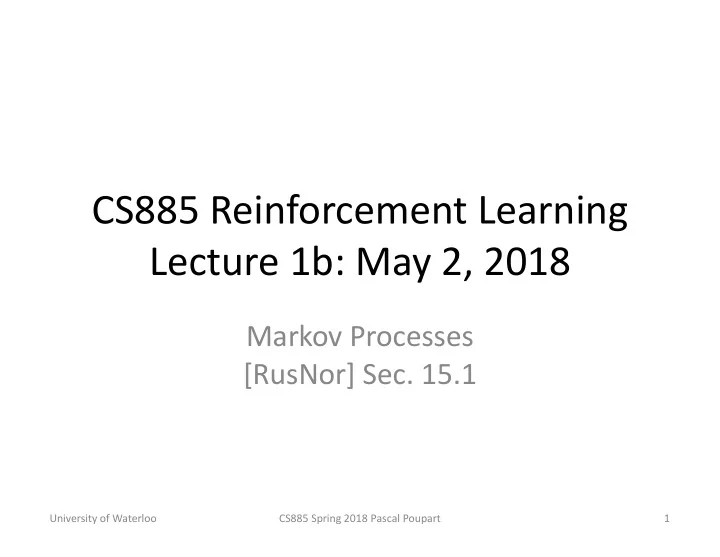

CS885 Reinforcement Learning Lecture 1b: May 2, 2018 Markov Processes [RusNor] Sec. 15.1 University of Waterloo CS885 Spring 2018 Pascal Poupart 1
Outline • Environment dynamics • Stochastic processes – Markovian assumption – Stationary assumption University of Waterloo CS885 Spring 2018 Pascal Poupart 2
Recall: RL Problem Agent State Action Reward Environment Goal: Learn to choose actions that maximize rewards University of Waterloo CS885 Spring 2018 Pascal Poupart 3
Unrolling the Problem • Unrolling the control loop leads to a sequence of states, actions and rewards: ! " , $ " , % " , ! & , $ & , % & , ! ' , $ ' , % ' , … • This sequence forms a stochastic process (due to some uncertainty in the dynamics of the process) University of Waterloo CS885 Spring 2018 Pascal Poupart 4
Common Properties • Processes are rarely arbitrary • They often exhibit some structure – Laws of the process do not change – Short history sufficient to predict future • Example : weather prediction – Same model can be used everyday to predict weather – Weather measurements of past few days sufficient to predict weather. University of Waterloo CS885 Spring 2018 Pascal Poupart 5
Stochastic Process • Consider the sequence of states only • Definition – Set of States: S – Stochastic dynamics: Pr(s t |s t-1 , …, s 0 ) s 0 s 1 s 2 s 4 s 3 University of Waterloo CS885 Spring 2018 Pascal Poupart 6
Stochastic Process • Problem: – Infinitely large conditional distributions • Solutions: – Stationary process: dynamics do not change over time – Markov assumption: current state depends only on a finite history of past states University of Waterloo CS885 Spring 2018 Pascal Poupart 7
K-order Markov Process • Assumption: last k states sufficient • First-order Markov Process – Pr(s t |s t-1 , …, s 0 ) = Pr(s t |s t-1 ) s 0 s 1 s 2 s 4 s 3 • Second-order Markov Process – Pr(s t |s t-1 , …, s 0 ) = Pr(s t |s t-1 , s t-2 ) s 0 s 1 s 2 s 4 s 3 University of Waterloo CS885 Spring 2018 Pascal Poupart 8
Markov Process • By default, a Markov Process refers to a – First-order process Pr # $ # $%& , # $%( , … , # * = Pr # $ # $%& ∀- – Stationary process Pr # $ # $%& = Pr # $ . # $ . %& ∀- / • Advantage: can specify the entire process with a single concise conditional distribution Pr(# / |#) University of Waterloo CS885 Spring 2018 Pascal Poupart 9
Examples • Robotic control – States: !, #, $, % coordinates of joints – Dynamics: constant motion • Inventory management – States: inventory level – Dynamics: constant (stochastic) demand University of Waterloo CS885 Spring 2018 Pascal Poupart 10
Non-Markovian and/or non-stationary processes • What if the process is not Markovian and/or not stationary? • Solution: add new state components until dynamics are Markovian and stationary – Robotics: the dynamics of !, #, $, % are not stationary when velocity varies… – Solution: add velocity to state description e.g. $, ̇ !, #, $, %, ̇ !, ̇ #, ̇ % – If acceleration varies… then add acceleration to state – Where do we stop? University of Waterloo CS885 Spring 2018 Pascal Poupart 11
Markovian Stationary Process • Problem: adding components to the state description to force a process to be Markovian and stationary may significantly increase computational complexity • Solution: try to find the smallest state description that is self-sufficient (i.e., Markovian and stationary) University of Waterloo CS885 Spring 2018 Pascal Poupart 12
Inference in Markov processes Common task: • – Prediction: Pr($ %&' |$ % ) Computation: • ' – Pr $ %&' $ % = ∑ - ./0 …- ./230 ∏ 567 Pr($ %&5 |$ %&587 ) Discrete states (matrix operations): • – Let 9 be a : ×|:| matrix representing Pr($ %&7 |$ % ) – Then Pr $ %&' $ % = 9 ' – Complexity: <(= : > ) University of Waterloo CS885 Spring 2018 Pascal Poupart 13
Decision Making Predictions by themselves are useless • They are only useful when they will influence future • decisions Hence the ultimate task is decision making • How can we influence the process to visit desirable • states? Model: Markov Decision Process • University of Waterloo CS885 Spring 2018 Pascal Poupart 14
Recommend
More recommend